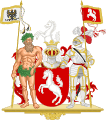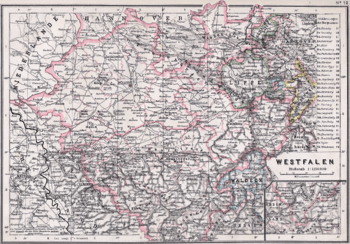Province of Westphalia
The Province of Westphalia (German: Provinz Westfalen) was a province of the Kingdom of Prussia and the Free State of Prussia from 1815[1] to 1946.[2]
| Province of Westphalia Provinz Westfalen | |||||||||||||||||||||||||||||
|---|---|---|---|---|---|---|---|---|---|---|---|---|---|---|---|---|---|---|---|---|---|---|---|---|---|---|---|---|---|
| Province of Prussia | |||||||||||||||||||||||||||||
| 1815–1946 | |||||||||||||||||||||||||||||
 Flag
 Coat of arms
| |||||||||||||||||||||||||||||
.svg.png) Westphalia (red), within the Kingdom of Prussia, within the German Empire | |||||||||||||||||||||||||||||
| Anthem | |||||||||||||||||||||||||||||
| Westfalenlied | |||||||||||||||||||||||||||||
| Capital | Münster | ||||||||||||||||||||||||||||
| Area | |||||||||||||||||||||||||||||
| • Coordinates | 51°58′N 7°38′E | ||||||||||||||||||||||||||||
• 1817 | 20,215 km2 (7,805 sq mi) | ||||||||||||||||||||||||||||
| Population | |||||||||||||||||||||||||||||
• 1925 | 4784000 | ||||||||||||||||||||||||||||
| History | |||||||||||||||||||||||||||||
• Established | 1815 | ||||||||||||||||||||||||||||
• Disestablished | 1946 | ||||||||||||||||||||||||||||
| Political subdivisions | Arnsberg Minden Münster | ||||||||||||||||||||||||||||
| |||||||||||||||||||||||||||||
History
Napoleon Bonaparte founded the Kingdom of Westphalia, which was a client state of the First French Empire from 1807 to 1813. This state shared only the name with the historical region, containing mostly Hessian and Eastphalian regions and only a relatively small part of the region of Westphalia.
Although Prussia had long owned territory in Westphalia, King Frederick William III had preferred to incorporate the Kingdom of Saxony first. It was not until the Congress of Vienna in 1815 that the Province of Westphalia came into being. The province was formed from several territories:
- regions in Westphalia under Prussian rule since before 1800 (the Principality of Minden and the counties of Mark, Ravensberg and Tecklenburg)
- the Bishopric of Münster and Bishopric of Paderborn, acquired by Prussia in 1802–03; the northernmost parts of the geographically enormous Bishopric of Münster, however, became part of the Kingdom of Hanover or the Grand Duchy of Oldenburg
- the small county of Limburg, acquired in 1808
- the Duchy of Westphalia, placed under Prussian rule in 1815 after the Congress of Vienna.
- the Sayn-Wittgensteiner principalities of Hohenstein and Berleburg, along with the principality of Nassau-Siegen (in 1817)
In 1816, the district of Essen was transferred to the Rhine Province.
Economy
- 1907
- 18% agriculture
- 59% industry
- 11% trade
After World War II
After the end of World War II, the province was merged with the northern half of the Rhine Province to form the German state of North Rhine-Westphalia in 1946, with the addition of the former state of Lippe in 1947.
Maps

Upper presidents
The Prussian central government appointed upper presidents as their representatives in the province, supervising the implementation of central prerogatives in Westphalia. Between 1920 and 1933 their appointment needed the consent of the provincial diet, in those years directly elected by the Westphalians.
| Term | Name |
|---|---|
| 1816 to 1844 | Ludwig Friedrich Freiherr von Vincke |
| 1845 to 1846 | Justus Wilhelm Eduard von Schaper |
| 1846 to 1850 | Eduard Heinrich Flottwell |
| 1850 to 1871 | Franz Gerhard Xaver von Duesberg |
| 1871 to 1882 | Friedrich von Kühlwetter |
| 1883 to 1889 | Robert Eduard von Hagemeister |
| 1889 to 1899 | Heinrich Konrad von Studt |
| 1899 to 1911 | Gustav Wilhelm Eberhard Freiherr von der Recke von der Horst |
| 1911 to 1919 | Karl Prinz von Ratibor und Corvey |
| 1919 | Felix Friedrich Graf von Merveldt, DNVP |
| 1919 to 1922 | Bernhard Wuermeling, Zentrum |
| 1922 | Felix Friedrich Graf von Merveldt, DNVP |
| 1922 to 1933 | Johannes Gronowski, Zentrum |
| 1933 to 1938 | Ferdinand von Lüninck, DNVP |
| 1938 to 1945 | Alfred Meyer, NSDAP |
| 1945 to 1946 | Rudolf Amelunxen, Zentrum, appointed by the British military government |
Land captains of Westphalia
The provincial diet, until 1886 represented by the Westphalian estates of the realm elected their president titled land captain. In the course of strengthening selfrule in the provinces the Westphalian provincial diet was reorganised as the legislation composing of representatives elected from the assemblies of the rural counties and independent cities in 1886. These districts and cities then formed the public-law corporation called the provincial federation (Provinzialverband). The elected speaker of the provincial diet, first titled land director (Landesdirektor), but renamed land captain in 1889, was simultaneously head of the provincial government, called provincial committee (Provinzialausschuss). Between 1920 and 1933 the provincial diet was directly elected by the Westphalian electorate. As of 1933, in the course of the abolition of parliamentarism in Nazi Germany, the land captains were appointed by the central Prussian government, presided over by Hermann Göring, and became subject to the directives of their respective upper president. Kolbow was still elected, by a provincial diet dominated by Nazi mandataries, his successors were appointed, with the diet officially dissolved in 1934. The task of the Westphalian provincial federation is carried on by the Regional Federation of Westphalia-Lippe, established in 1953 and also including the county comprising the territory of the former Free State of Lippe, disestablished in 1947.
| Term | Name |
|---|---|
| 1886 to 1900 | August Overweg, titled land director until 1889 |
| 1900 to 1905 | Ludwig Holle |
| 1905 to 1919 | Wilhelm Hammerschmidt |
| 1920 to 1933 | Franz Dieckmann, Zentrum |
| 1933 to 1944 | Karl-Friedrich Kolbow, NSDAP |
| 1944 per pro | Theodor Fründt, NSDAP |
| 1944 to 1945 | Hans von Helms, NSDAP |
| 1945 to 1954 | Bernhard Salzmann, appointed by the British military government |
References
- lieber, francis (1851). a popular dictionary of arts, sciences, literature, history, politics, and biography. p. 139.
- Mitchell, Maria (2012-10-04). The Origins of Christian Democracy: Politics and Confession in Modern Germany. University of Michigan Press. p. 141. ISBN 0472118412.